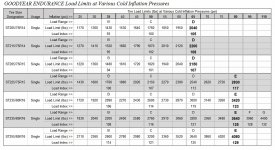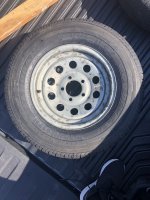matt167
Rear Admiral
- Joined
- Sep 27, 2012
- Messages
- 4,276
I install trailer tires professionally as part of my day job and not through a mcdiscount tire shop. so I can give some sound, accurate advice.
The best tire that you can buy is Goodyear Endurance radial. The Goodyear Marathon is a tire to avoid.
Michellin rates their LT truck tires for trailer service, if your size is available
A good runner up is a Carslile Radial Trail, or any other radial trailer tire that has a wider casing. Cheap junk tires will have beads that nearly touch each other when deflated.
Only buy a bias ply if you must. They are on the low end of the cost spectrum and a handful of use case scenario's where they are better ( not on a boat trailer ).. If you end up spending anything more than $40 more each per tire, give or take, you are getting ripped off.. Keep in mind tire prices are going up daily at this point
The best tire that you can buy is Goodyear Endurance radial. The Goodyear Marathon is a tire to avoid.
Michellin rates their LT truck tires for trailer service, if your size is available
A good runner up is a Carslile Radial Trail, or any other radial trailer tire that has a wider casing. Cheap junk tires will have beads that nearly touch each other when deflated.
Only buy a bias ply if you must. They are on the low end of the cost spectrum and a handful of use case scenario's where they are better ( not on a boat trailer ).. If you end up spending anything more than $40 more each per tire, give or take, you are getting ripped off.. Keep in mind tire prices are going up daily at this point





















